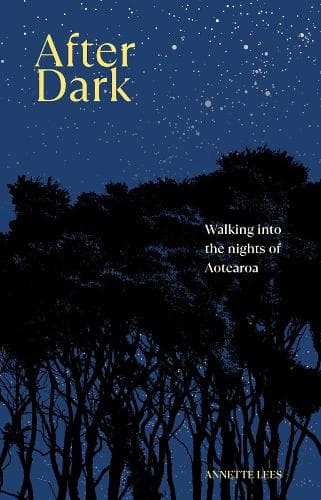Review: After Dark: Walking into the nights of Aotearoa
Reviewed by Samuel Finnemore
As New Zealanders start to stretch our days out into warmer evenings, Annette Lees’ After Dark is an invitation to push the boundary a bit further. It takes only 17 minutes from Gisborne to New Plymouth, and 60 seconds across Tāmaki Makaurau, for dusk to cover Aotearoa from east to west.
But that’s just the curtain rising on a world that’s expanding and transforming beyond our daytime perspective, even the conventions of daytime language.
“Night doesn’t fall,” writes Lees, “it rises.”
After Dark traces the course of the night hour by hour in a carefully paced journey with Lees as fellow traveller and guide. It’s a gloriously unhurried experience, unfolding at walking pace or standing still to watch, listen and feel, and one that defies categorisation: at once a natural history of Aotearoa’s nights from forest to sea floor, a social chronicle of the meanings we place on the hours of darkness, and a storehouse of memories and anecdotes from Lees’ journeys as ecologist, conservationist and lifelong appreciator of night-time experiences.
After Dark is a sensory experience in itself. Lees isn’t just acutely aware of the fine changes in our senses that come with night-time – the way human vision adjusts, the peak of skin sensitivity that arrives about an hour before midnight – but distils that knowledge and awareness into descriptions of sight, sound, scent and touch that have a near-telepathic precision. You couldn’t wish for a clearer voice at your ear, one that keeps the narrative grounded and embodied and turns each aspect of its storytelling to best advantage.
Lees’ recollections of childhood and adolescence in Raetihi and Whakatāne have the same immediacy as her descriptions of contemporary life in the Waikātere River valley. They shade into social history, as Lees turns a sociologist’s eye on her memories of rural evenings and nights, and then extends these seamlessly backwards in time to explore the evolution of daylight saving, street lamps – decried as wasteful in the early years when left on at full moon – and social wrangles over maintaining wartime blackout rules, with a cast of flouters, enforcers and literal curtain-twitchers.
Both a journey and a compendium of journeys, most of the experiences collected in After Dark are Lees’ own, whether in her neighbourhood surrounds or across a sweep of New Zealand landscapes and environments from beach to mountaintop. Some are moments of reflection and time alone; others are in company, from astronomical vigils to raucous beach parties, and still others share the unique experiences of midnight surfers, fireworks experts or scuba divers exploring the seabed by moonlight, with snapper dozing in the current.
Lees conveys an easy, engaging fascination with a swathe of Aotearoa’s nocturnal creatures, from ram’s horn squid migrating nightly to the surface from a kilometre deep, to the chorus of night insects, the booming of kākāpō, and the flight of pekapeka or native bats (both the short-tailed and recently celebrated long-tailed varieties). Tagging along in the company of conservationists and citizen scientists, Lees examines these creatures’ behaviour and their own unique sensory world with empathy and imagination as well as acknowledging human failure to protect them and their environments. There are permanent missing notes, we’re reminded, in the soundscapes of night-time and dawn chorus.
After Dark has its own subtle, meditative rhythm with a sense of Lees making her own distinctions of time as the stars turn and returning to ideas and themes chapter by chapter to deepen their meaning. Her voice is a gentle, informed, endlessly curious companion for the reader – and in the far reaches of the night it’s one that confides, in a moment all the more heart-breaking for the sense of having walked so far in Lees’ company. Finding that memory placed with such tenderness at the heart of After Dark, as a universe of life whirls around it, caps an already remarkable book with an act of love and courage. The break of dawn completes the sense that you’ve been through something extraordinary.
Reviewed by Sam Finnemore
